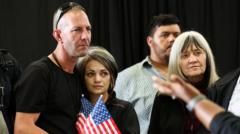A group of 59 white South Africans landed at Dulles Airport in Washington, D.C., on Monday, having received refugee status through an expedited process spearheaded by former President Donald Trump. This initiative primarily focuses on the Afrikaner minority, described by Trump as victims of "racial discrimination" in South Africa. However, the South African government has vehemently denied the existence of such persecution, stating that the criteria for refugee status are not met by these individuals.
While the US has ceased accepting refugees from many war-torn regions, Human Rights Watch condemned the Trump administration's actions, labeling them a "cruel racial twist" in a system that has left thousands of non-white refugees, including many from Afghanistan, without asylum. The arrival of the South African group was marked by a celebratory welcome from US authorities, contrasting sharply with the common lengthy process for asylum seekers in the country.
During a press interaction, Trump pointed out claims of a "genocide" against white farmers in South Africa as a justification for the rapid processing of their refugee applications. He asserted that the racial identity of farmers was irrelevant to the violence they faced. In a phone call with Trump, South African President Cyril Ramaphosa characterized the claims as "untrue" and incompatible with the definition of a refugee, which must involve a legitimate threat of persecution.
In response to the announcement, US Deputy Secretary of State Christopher Landau suggested it's not unusual for a country to reject accusations of persecution directed at its citizens. The issue at hand is complicated by ongoing debates regarding land reform in South Africa, where black individuals constitute over 90% of the population but own only 4% of privately held land, leading to accusations of slow reform and discrimination.
Some supporters, including South African-born entrepreneur Elon Musk, have echoed calls about the perceived victimization of white South Africans, arguing that their plight is often overlooked. Presidential adviser Gregory Meeks termed the expedited refugee settlement a racially motivated diversion from historical accuracy, while organizations like the Episcopal Church have severed ties with federal refugee programs due to preferential treatment for the Afrikaners.
Legal experts and human rights advocates have raised concerns about the implications of Trump's policies, citing hypocrisy in the immigration system, especially considering the suspension of the broader Refugee Admissions Program (USRAP) which left many vulnerable refugees in limbo. Responses from within South Africa express skepticism toward claims of persecution, dismissing them as baseless.
Overall, the unfolding situation highlights the complexities of US immigration policy, where racial dynamics play a pivotal role, leading to tensions in international relations and domestic societal discourse. The geopolitical ramifications continue to evolve as bilateral interactions between the US and South Africa, already strained over numerous issues, took yet another turn in the wake of this controversial refugee issue.




















